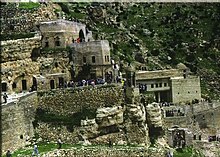Rabban Hormizd Monastery
| Rabban Hormizd Monastery | |
|---|---|
 |
|
| Basic information | |
| Location | Alqosh, Nineveh, Assyria |
| Geographic coordinates | 36°44′57″N 43°06′52″E / 36.749167°N 43.114444°ECoordinates: 36°44′57″N 43°06′52″E / 36.749167°N 43.114444°E |
| Affiliation | Chaldean Catholic |
| Completed | 640 A.D. |
Rabban Hormizd Monastery is an important monastery of the Chaldean Catholic Church, founded about 640 AD, carved out in the mountains about 2 miles from Alqosh, Iraq, 28 miles north of Mosul. It has been the official residence of the patriarchs of the Eliya line of the Church of the East from 1551 to the 18th century, and after the union with Rome in the early 19th century, it became a prominent monastery of the Chaldean Catholic Church.
The monastery is named after Rabban Hormizd (rabban is the Syriac for monk) who founded it in the seventh century.
Because of the fame of Rabban Hormizd, the monastery he founded became extremely important for the Church of the East. It flourished until the 10th century. Already, before the end of the 15th century, the Rabban Hormizd Monastery served as the patriarchal burial site. Yohannan Sulaqa was monk of the Rabban Hormizd Monastery before his travel to Rome to become the first Patriarch of the Chaldean Catholic Church.
Between 1551 and the 18th century, the monastery became the official residence of the patriarchs of the Eliya line of the Church of the East, which was the oldest and largest patriarchal See of the Church of the East, the only one existing patriarchal line before the Sulaqa's 1553 split. Nine patriarchal graves, from 1497 to 1804, are still located in the corridor that leads to the cell of Rabban Hormizd.
In about 1743, due to pestilence and the attacks of the Kurds, the monastery was left unmanned. In 1808, the Assyrian Gabriel Dambo (1775-1832) revived the abandoned monastery, rebuilt it, collected a number of pupils vowed to poverty and celibacy, and installed there a seminary. At first this initiative was opposed by Yohannan VIII Hormizd, then Archbishop of Mosul, even if it was supported by the patriarchal administrator Augustine Hindi. Patriarch Joseph Audo, before he was appointed the bishop of Mosul, was himself a monk of Rabban Hormizd monastery.
...
Wikipedia
